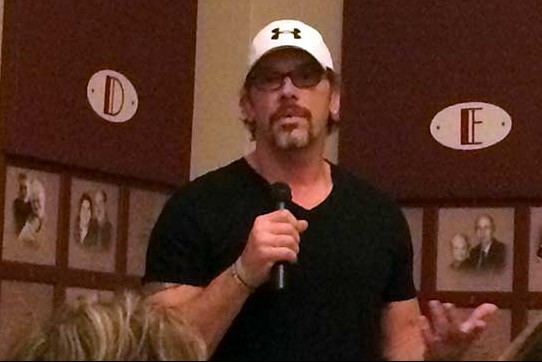Ex-NHLer tells his story at suicide-prevention session in Stirling

STIRLING – Shawn Antoski, who played for several NHL teams, talks about his struggles with depression and how he overcame them. Photo by Megan Pounder, QNet News
STIRLING – Shawn Antoski was a big star in the 1990s, playing left wing with the Vancouver Canucks, Philadelphia Flyers and Anaheim Mighty Ducks. Then a skull fracture caused by a car accident ended his NHL career, and he entered a time when depression took hold.
The only way he was able to overcome it, he told a Stirling audience Wednesday, was “not to fear.”
Antoski, a native of Brantford, Ont., who now lives in Madoc, was one of the speakers at a suicide-prevention session at the Stirling Festival Theatre.
What helped him in his struggle was speaking to other people who were suffering, and their loved ones, he said.
“I had to talk, had to express – but I also needed somebody to relate to that.”
He was also helped by the two-hour therapy sessions he attended three to four times a week for seven months, he said.
Finally, he did a great deal of research, reading as much as he could about depression.
In an effort to help others, Antoski founded an organization called Fear Nothing. It has over 400 members.

Mental-health counsellors Tammy Orr (left) and Kim Leighton talk about services and resources available to people suffering with mental-health issues. Photo by Megan Pounder, QNet News
Mental-health counsellor Tammy Orr talked about the danger signs that a person may be suicidal. Signs to look out for, she said, are “repeated expression of hopelessness, behaviour that is out of character, signs of depression, a sudden and unexpected change in a cheerful attitude, giving away prized possessions, making a will, taking out insurance or other preparations for death, and making remarks about death or an expressed (intent) to commit suicide.”
It’s important to listen to people who are in this state and try to help by disabling their suicide plan, if you know what it is, making a safety contract, and linking them to resources, Orr said.
“Don’t be afraid to ask (friends or loved ones) about suicide, or if they’re thinking about killing themselves. This is not going to make someone who’s not feeling that way … start feeling that way. It can only decrease the likelihood that maybe they might take action on it, if you open up that line of communication with them.”
Stirling-Rawdon police officer Tom Wilson explained the ways the police try to help, citing an Ontario pilot program in which officers drive around with crisis workers and respond to mental-health calls. It is “having great success,” he said.
“I think we’ll be seeing in the next few years … some great things like that move forward, and some big changes in the way we address mental-health issues in the policing perspective, and hopefully society as well.”
All of the speakers emphasized that there is always hope and one should never give up.
The night ended with a question-and-answer session. One young man spoke of his struggles with depression. Suicidal people either don’t know or have lost a sense of what their purpose is, and need help figuring that out, he said.
Antoski ended the night by saying, “It takes a community to raise a child; we’re needing a community to save them now.”
 Print This Post
Print This Post






